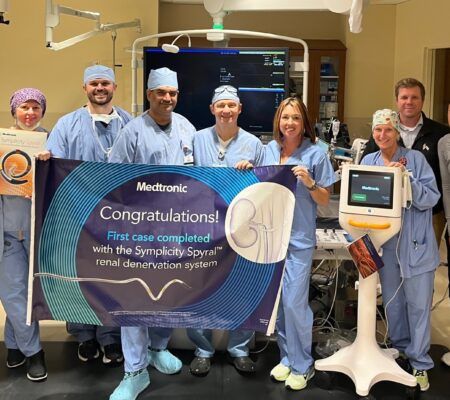- Conditions
- Neurogenic Bladder
- Abdominal Aortic Aneurysm
- Absence Seizures
- Achalasia
- Acid Reflux and Gastroesophageal Reflux Disease (GERD)
- Acne
- Acoustic Neuroma
- Acquired Hemophagocytic Lymphohistiocytosis (HLH)
- Acromegaly
- Actinic Keratosis
- Acute Bacterial Sinusitis
- Acute Bronchitis
- Acute Liver Failure
- Acute Lymphocytic Leukemia
- Acute Myeloid Leukemia (AML)
- Acute Pancreatitis
- Acute Spinal Cord Injury
- Adrenal Insufficiency (Addison Disease)
- Age-Related Hearing Loss (Presbycusis)
- Age-Related Macular Degeneration (AMD)
- Alagille Syndrome
- Alcohol-Induced Liver Disease
- Alcoholic Hepatitis
- Allergy
- Alpha Thalassemia
- Alzheimer Disease
- Amenorrhea
- Ampullary Cancer
- Amyotrophic Lateral Sclerosis (ALS)
- Anal Fissure
- Anal Fistula
- Analgesic Nephropathy
- Anastomotic Leak After Gastric Bypass Surgery
- Anemias
- Aneurysm
- Angina Pectoris
- Ankle Dislocation
- Ankylosing Spondylitis
- Annular Pancreas
- Anorectal Abscess
- Anorexia Nervosa
- Aortic Valve Regurgitation
- Aphasia
- Aplastic Anemia
- Appendicitis
- Arrhythmias
- Arteriovenous Malformations (AVM)
- Arthritis
- Asthma
- Ataxia
- Ataxia Telangiectasia (A-T)
What is a neurogenic bladder?
The muscles and nerves of the urinary system work together to hold and release urine at the right time. Nerves carry messages between the bladder and the spinal cord and the brain. The messages tell the bladder muscles to either tighten or release.
With neurogenic bladder, these nerves don’t work the way they should.
What causes neurogenic bladder?
These are some possible causes of neurogenic bladder:
- Diabetes
- Infections
- Accidents that cause injury to the brain or spinal cord
- Genetic nerve problems
- Heavy metal poisoning
- Birth defects that affect the spinal cord
- Brain or spinal cord tumors
- Stroke
- Herniated disks
- Multiple sclerosis
- Parkinson disease
What are the symptoms of neurogenic bladder?
These are the most common symptoms of neurogenic bladder:
- Urinary tract infection (UTI)
- Kidney stones
- Unable to control urine (urinary incontinence)
- Small amount of urine when urinating
- Urinary frequency and urgency
- Dribbling urine
- Loss of feeling that the bladder is full
- Unable to urinate
The symptoms of neurogenic bladder may look like other conditions. Always talk with a healthcare provider for a diagnosis.
How is neurogenic bladder diagnosed?
If your healthcare provider thinks you may have neurogenic bladder, he or she will want to check your brain, spinal cord, and bladder. He or she will review your health history and do a physical exam. Other tests may include:
- X-rays of the skull and spine. This imaging test uses invisible energy beams to make images of tissues, bones, and organs.
- Imaging tests of the bladder and ureters
- Ultrasound (sonography). This imaging test uses sound waves to create images of the organs on a computer screen.
- Cystoscopy. Your healthcare provider puts a thin, flexible tube and viewing device in through the urethra to examine the urinary tract. It checks for structure changes or blockages, such as tumors or stones.
- Tests that are done by filling the bladder, such as urodynamics. These tests show how much the bladder can hold. They also check to see if it fully empties.
How is neurogenic bladder treated?
Treatment for neurogenic bladder depends on the cause. It’s aimed at preventing kidney damage and may include:
- Medicines
- Emptying the bladder with a catheter at regular times
- Preventive antibiotics to reduce infection
- Placing an artificial cuff around the neck of the bladder which can be inflated to hold urine and deflated to release it
- Surgery to remove stones or blockages
- Botulinum toxin shots (injections) into the bladder muscle
- Placing an electrical device to stimulate or slow down bladder activity
What are possible complications of a neurogenic bladder?
The following are often linked to a neurogenic bladder:
- Urine leakage. This often happens when the muscles holding urine in don’t get the right message.
- Urine retention. This happens if the muscles holding urine in don’t get the message that it’s time to pass urine.
- Damage to the tiny blood vessels in the kidney. This may happen if the bladder becomes too full and urine backs up into the kidneys. This causes extra pressure. It may lead to blood in the urine and kidney failure.
- Infection of the bladder, ureters, or kidneys. This often results from urine that is held too long before it’s passed out of the body.
Key points about neurogenic bladder
- With neurogenic bladder, the nerves that carry messages back and forth between the bladder and the spinal cord and brain don’t work the way they should.
- Common symptoms include dribbling urine, loss of feeling that the bladder is full, and being unable to control urine (urinary incontinence).
- Damage or changes in the nervous system and infection can cause neurogenic bladder.
- Treatment is aimed at preventing kidney damage. It may include medicine, urinary catheters, antibiotics to reduce the chance of infection, and in severe cases, surgery.
- Some complications include urine leakage, inability to pass urine, kidney damage, and kidney or urinary tract infections.





